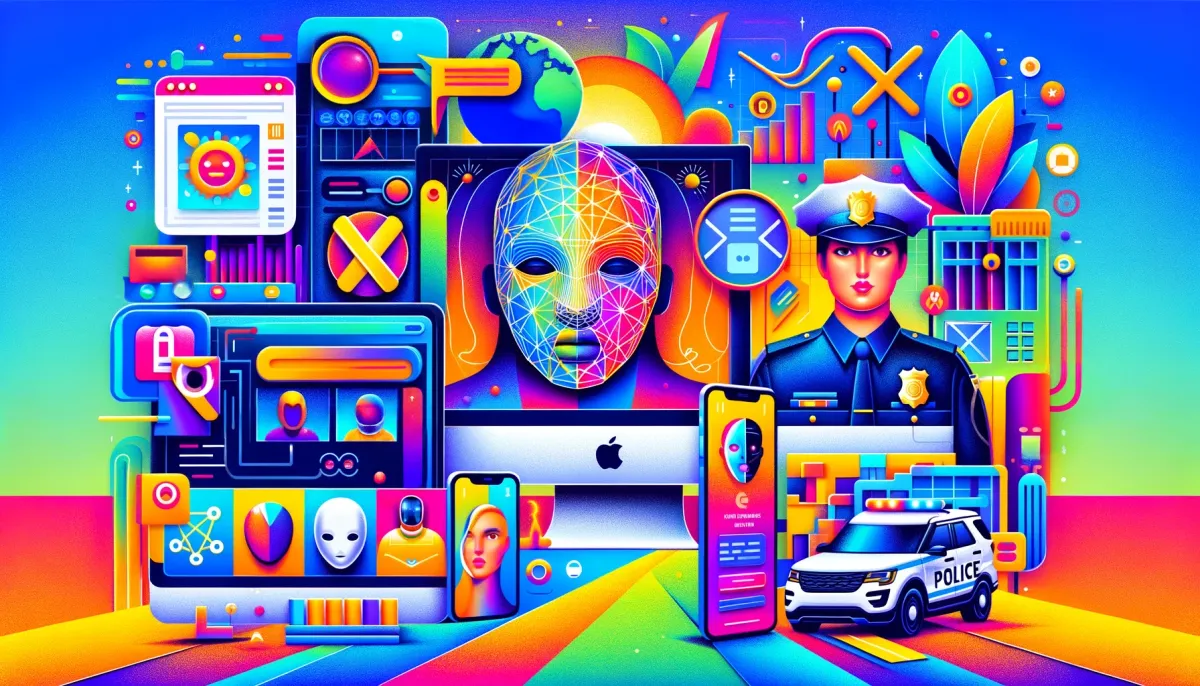AI News Roundup: Key Developments and Innovations in Artificial Intelligence- Wednesday 5th of June 2024
Stay updated with our AI news roundup. Apple is integrating ChatGPT features into iOS 18, OpenAI's Media Manager, and Microsoft's ban on police facial recognition and Apple's WWDC 2024.

1. Apple Integrates ChatGPT Features in Upcoming iOS 18
Apple is set to integrate ChatGPT features into its forthcoming iOS 18, marking a significant step in its commitment to advancing AI technology. This integration is part of a broader update expected to be unveiled at the Worldwide Developers Conference (WWDC) in June 2024. By incorporating OpenAI's ChatGPT, Apple aims to enhance the user experience with more intuitive and interactive AI capabilities on the iPhone.

The ChatGPT features will enable users to interact with their devices in more natural and conversational ways, making tasks such as setting reminders, sending messages, and searching for information more seamless. This move aligns with Apple's strategy to leverage AI to improve the functionality and appeal of its ecosystem. Additionally, this collaboration with OpenAI demonstrates Apple's dedication to staying at the forefront of AI innovation.
However, there are concerns about privacy and data security with the integration of advanced AI features into consumer devices. Critics argue that incorporating AI models like ChatGPT could potentially expose users to new risks, such as data breaches or unauthorized access to personal information. Apple will need to address these concerns robustly to ensure user trust and safeguard against potential vulnerabilities.
2. OpenAI's Media Manager for Ethical AI
OpenAI has announced the development of Media Manager, a tool designed to empower content creators to manage how their works are utilized in AI training. This initiative seeks to establish new standards for transparency and accountability in the AI industry, responding to growing concerns over the ethical use of data. Set to be released within the next few months, Media Manager will allow creators to specify ownership and usage preferences for their content, ensuring more control over their intellectual property.

The Media Manager tool represents a proactive step by OpenAI to address the complex issues surrounding content ownership and usage in AI development. By providing a platform for creators to manage their contributions, OpenAI aims to foster a collaborative environment that benefits both the AI community and content owners. This initiative is expected to pave the way for more ethical practices in the industry.
Despite its potential benefits, the Media Manager tool could face challenges in implementation and adoption. Critics point out that ensuring widespread compliance and cooperation from all stakeholders might be difficult. Additionally, there are concerns about the tool's ability to effectively manage and enforce usage rights, especially in the rapidly evolving landscape of AI technology.
3. Microsoft Bans Police Use of Azure OpenAI for Facial Recognition
Microsoft has reinforced its prohibition on U.S. police departments using its Azure OpenAI Service for real-time facial recognition. This updated policy explicitly prevents integrations from being used by or for police departments in the U.S. for applications like body cameras and dashcams. The decision follows concerns about AI hallucinations and racial biases, particularly in the context of law enforcement.

This policy adjustment is part of Microsoft's broader commitment to ethical AI practices. By limiting the use of its facial recognition technology in law enforcement, Microsoft aims to mitigate potential misuse and ensure that its AI solutions are deployed responsibly. This move is also in response to the increasing scrutiny of facial recognition technology and its implications for privacy and civil liberties.
However, the ban has sparked a debate about the balance between ethical considerations and technological advancements. Some argue that the restriction could hinder the development and application of potentially beneficial AI technologies in public safety. There is also concern that this policy might push law enforcement agencies to seek less regulated and potentially less ethical alternatives, undermining efforts to ensure responsible AI use.
4. Advancements in AI Models by OpenAI and Google
OpenAI and Google have announced significant advancements in their AI models, highlighting their continued leadership in the field. OpenAI's GPT-4o has secured top positions in text-based AI benchmarks, while Google's Gemini 1.5 Flash and Pro models have achieved notable milestones. These developments underscore the rapid progress being made in AI capabilities, particularly in natural language processing and multimodal AI.
The improvements in these AI models promise to enhance various applications, from more sophisticated virtual assistants to advanced data analysis tools. OpenAI's GPT-4o and Google's Gemini models represent cutting-edge innovations that are expected to drive the next generation of AI-powered solutions. These advancements also reflect the intense competition between leading tech companies to push the boundaries of AI technology.

Despite these achievements, there are ongoing concerns about the ethical implications and potential risks associated with powerful AI models. Critics warn that as AI systems become more advanced, the challenges of ensuring their safe and responsible use will grow. Issues such as algorithmic bias, transparency, and accountability remain critical areas that need to be addressed to prevent unintended consequences and ensure that AI benefits society as a whole.
5. Apple WWDC 2024 Announcements
Apple has revealed the dates for its Worldwide Developers Conference (WWDC) 2024, where significant AI and technology updates are anticipated. The event, scheduled for June, will focus on the latest advancements in Apple's software ecosystem, including new features in iOS and macOS. While no new hardware announcements are expected, the software updates are set to enhance the functionality and user experience across Apple devices.
At WWDC 2024, Apple is likely to showcase its continued integration of AI technologies into its products, reflecting its commitment to innovation. The event will provide a platform for developers to explore new tools and frameworks, fostering creativity and collaboration within the Apple ecosystem. Key highlights are expected to include enhancements to Siri, improved machine learning capabilities, and more intuitive user interfaces.

However, some industry observers have expressed disappointment over the lack of new hardware announcements. Critics argue that while software updates are important, hardware innovations are equally crucial for maintaining Apple's competitive edge. The anticipation for groundbreaking devices remains high, and Apple will need to balance its focus on software with continued advancements in hardware to meet consumer expectations.




